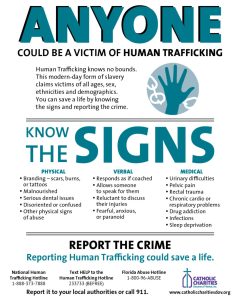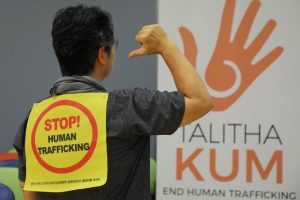Judy Bokorney – Special to the Florida Catholic
Dick and Betty Porrel used to buy homes, fix them up and sell them to help with the cost of college tuition for their six children. Today, now in their mid-80s, they again refurbish homes but this time it is for survivors of human trafficking.
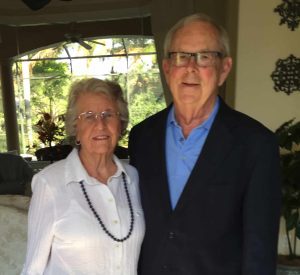
“The Porrels have been instrumental in the development of the transitional homes we have for the Anti Human Trafficking Assistance Program,” said Catholic Charities Program Coordinator Erika Pineros. “They have furnished all of the six units. They have bought couches, beds, dressers, kitchen supplies, dining tables, washers and dryers, stoves, refrigerators and more. They assessed each unit and fully equipped them with the essentials.”
The Porrels are active members of the advisory board for Catholic Charities in Lee, Hendry and Glades counties. They began volunteering for the Anti Human Trafficking Assistance Program when the first transitional home was purchased in 2017.
“We liked the idea of helping to renovate the house,” said Dick Porrel. “We enjoyed doing the work together back when our children were young. We still do today. It feels like a natural way for us to volunteer.”
Dick stated it was important for the program to provide transitional housing. “How will survivors fully become self-sufficient without housing? They need a safe place to live where they cannot be found by their traffickers.”
The three transitional houses are duplexes with each unit having two bedrooms with two beds in each room. Four people can live in each unit totaling eight for each duplex.
The Porrels began helping with the first duplex doing small repairs and supplying all the furniture, household items and appliances, if needed. They donated the cost of everything.
“We went to St. John the XXIII Parish Thrift Store to get supplies for the first two duplexes,” said Betty Porrel. “When we went back there to shop for the third duplex, the store manager asked us what we were doing and why we kept coming back and looking for more items. We explained our volunteer project and she said that we could have anything we needed for free.”
“She started to save items for us,” continued Betty. “We only wanted to take what was necessary to furnish and equip the home, but she insisted on extra things such as decorations and accessories. She was so generous.”
Pineros said the transitional housing would not have been implemented if not for the support of the Porrels.
“I was in awe of their dedication to each home,” she said. “They have done this with love. I have witnessed the hard work they have put into making these properties into comfortable homes.”
Currently, the transitional homes are all occupied. “The focus of the program is to bridge the gap that survivors encounter, the main one being housing. We continue to have a need for more housing and will look for funding opportunities to acquire more. The transitional homes were developed to allow survivors to learn essential living skills,” said Pineros.
The Porrels agreed if additional housing is purchased, they will outfit the homes again. “This is something we can do together as a couple, and we love to be together,” said Betty. “It is great. You feel like you are accomplishing something. We are helping people,” said Dick.
The Anti Human Trafficking Assistance Program provides clients with: food and clothing; shelter at a safe distance from the site of the exploitation and transitional housing; coordination of medical and dental services; weekly supportive counseling and further mental health services as needed; transportation to and from appointments; orientation to state and federal laws and benefits; assistance with benefit applications; coordination of educational and English as a second language (ESOL) services; liaison with law enforcement and immigration service providers; and coordination with various community agencies for other required services.
Pineros said the program will soon offer coaching and mentoring for survivors as well. “It really does take a village to offer all the services survivors need to heal and reach self-sufficiency.”
For more information, please call 239-390-2928 or email epineros@ccslee.org.
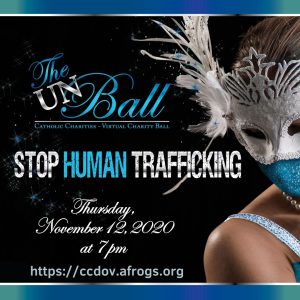 During the 45-minute virtual event, you will not only hear a survivor share her inspirational story and learn how you can make an impact, but you will also have the opportunity to support victims of human trafficking regain their lives and dignity. Please consider a donation or bid on some of the great auction items at https://ccdov.afrogs.org.
During the 45-minute virtual event, you will not only hear a survivor share her inspirational story and learn how you can make an impact, but you will also have the opportunity to support victims of human trafficking regain their lives and dignity. Please consider a donation or bid on some of the great auction items at https://ccdov.afrogs.org.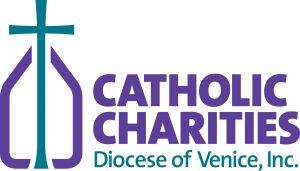 Bidding is open now through 9 p.m., Nov. 12 at https://ccdov.afrogs.org for auction items which include: a private Villa Vacation in Southern Italy; wine pull’; tickets to the 2021 Final Four; a 5-star getaway to Napa Valley wine country; and a sing-along Zoom with a Broadway star. In addition, a generous donor is providing a matching gift of $50,000 for “The UnBall.”
Bidding is open now through 9 p.m., Nov. 12 at https://ccdov.afrogs.org for auction items which include: a private Villa Vacation in Southern Italy; wine pull’; tickets to the 2021 Final Four; a 5-star getaway to Napa Valley wine country; and a sing-along Zoom with a Broadway star. In addition, a generous donor is providing a matching gift of $50,000 for “The UnBall.”





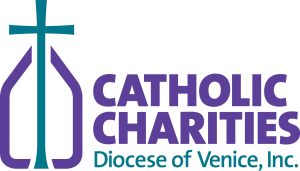 Add the COVID-19 Pandemic into the mix and many who were far along in the process into leading a “normal” life free from fear, are now at high risk of being trafficked again.
Add the COVID-19 Pandemic into the mix and many who were far along in the process into leading a “normal” life free from fear, are now at high risk of being trafficked again.